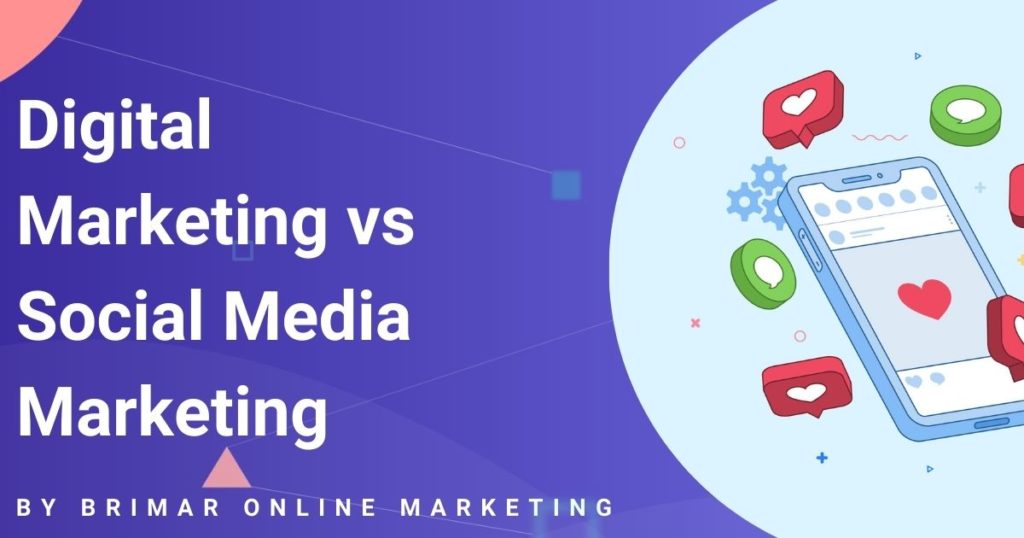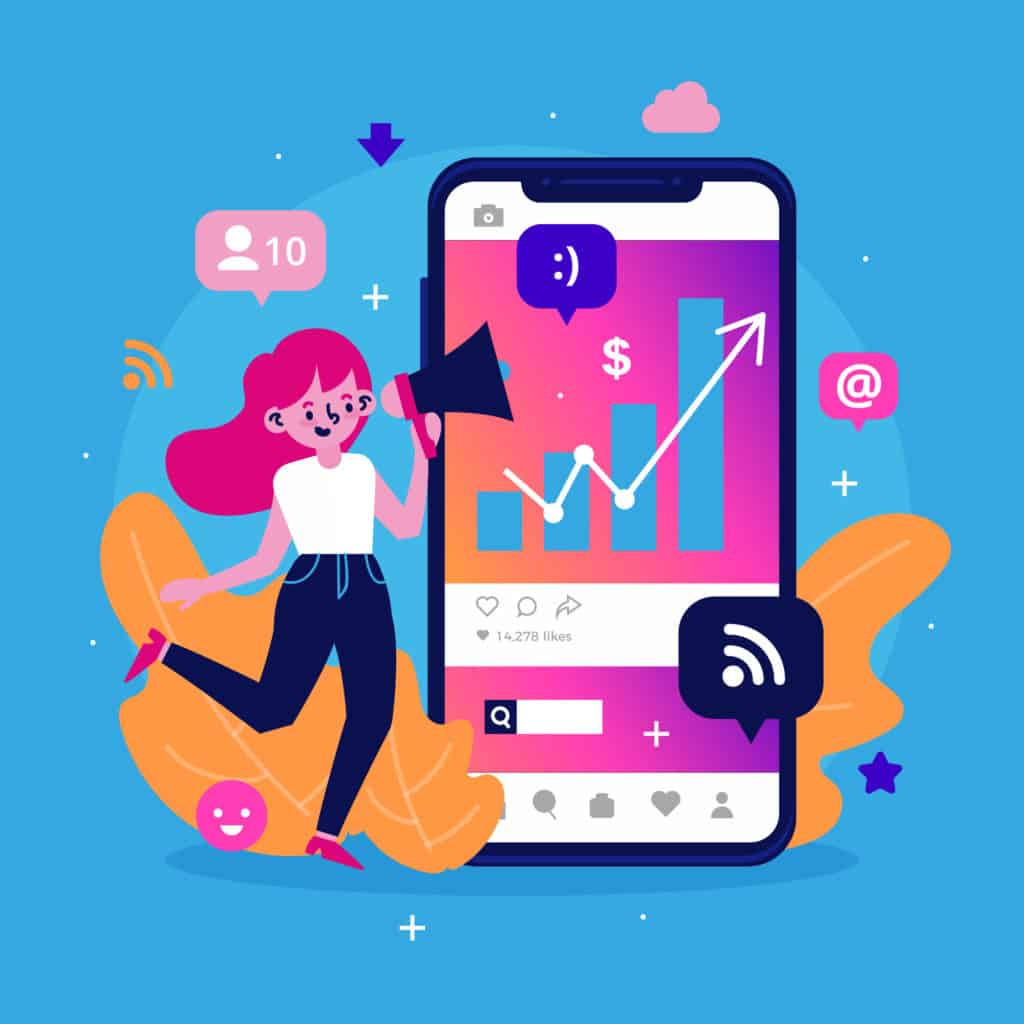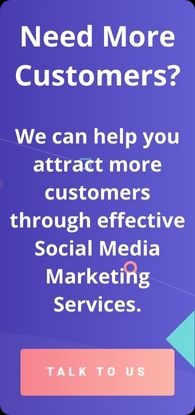
When trying to decide between digital marketing vs social media marketing to promote your product or services, some questions may arise such as, which one would be more profitable for my business model, or should I use both?
Well, in this article we are going to compare both concepts, so you know which one you should choose to start promoting your business.
Is Digital Marketing and Social Media Marketing the Same?
The short answer is no. But let’s describe these terms a little bit better.
What is Digital Marketing?
Digital marketing is the set of methodologies, techniques, and means used to promote products or services through online marketing channels such as:
- Email Marketing
- Pay Per Click
- SEO
- Social Media Marketing
Need a Sales Funnel that Converts?
Struggling to turn clicks into customers?
A high-converting sales funnel could be the missing link. We’ll help you build a simple, straightforward, and effective funnel that guides your visitors step-by-step, so they take action, not just browse.
What is Social Media Marketing?
Social media marketing uses specifically social media platforms and networks to promote your products and services.
In that sense, social networks like X, Facebook, Instagram, Pinterest, even Twitch, and YouTube are some of the digital networks where social media marketing takes place.
Check how social media has changed marketing here.
What is the Difference Between Digital Marketing and Social Media Marketing?

There are several differences between digital marketing vs social media marketing.
But we can summarize these differences in this short sentence:
Social media marketing is just one channel among all those that make up digital marketing.
You can think of digital marketing as the tree and social media marketing as a branch.
Now, let’s explore these differences in detail.
Key Differences
Since each marketing approach is different, it is worth pointing out the main differences, so you do not get confused.
We’ve summarized the key differences between social media marketing vs digital marketing into three main points:
1. Channel: Digital marketing can be used to reach people through websites, email, and even mobile app ads, all at the same time.
While social media marketing can be used to reach a targeted audience on social networks such as Facebook.
2. Tools: The tools change depending on the channel being used, for example, if using SEO, some popular tools would be Google Search Console or ahrefs.
On the other hand, in social media marketing, some resonant tools would be Meta Business Suite or Sprout Social.
3. Techniques: A digital marketing manager must take into account all digital channels when doing strategic planning.
On the other hand, a community manager or social media marketing manager must know exactly how each social platform or social network works in depth.
Both concepts are interconnected, but each specialist has a different scope and depth of knowledge depending on the channel.
Which One Is More Important?

Designed by Freepik
This is a tricky question.
Both are important.
As we said previously each one has some weak points and strengths, and all will depend on your marketing personal and business goals.
Sometimes, in the beginning, all strategies must have at least a try.
After that try, you can start to see which is more important, and more efficient.
Alternatively, you can hire a digital marketing company to analyze which approach would be better for you.
Let’s imagine for a moment that your company sells medical supplies such as mattresses to prevent bedsores.
In this case, a good way to make more people aware of your brand and products is to create content in a blog to inform the public about the materials, manufacturing techniques, proper use, and even the right way to clean these types of mattresses.
This blog should lead to an e-commerce page or some landing page to offer your mattress, or at least have a place to capture emails from prospective customers and then offer them via email some promotional merchandise.
Now let’s think for a moment that your company sells something intangible like insurance.
Then you might want to approach your potential customers in a more eye-catching way.
Something that is easily shareable and easy to understand so that the brand can gain the trust of the public.
Then you may want a social media marketing approach.
In this case, you should plan your monthly posts, post daily and communicate to your audience how your company will take care of them in case of an accident or even a calamity.
You can post an image and put a short meaningful sentence on it, you can post a short video on how the insurance policy will help,
you can post tips on how to make the most of the policies and coverages, and you can even post memes related to the service you provide.
All this is to earn the customer’s trust and put you in their mind as a reliable company.
So, there is no such thing as “more important” between digital marketing and social media marketing.
You should choose the one that adjusts better to your own business needs or even using both at the same time.
What are the Advantages of Using Social Media Marketing in Your Digital Marketing Strategies?
The ultimate goal of any marketing effort is to reach people’s minds as the main solution to a problem, or as the best brand in the market.
By using social media marketing to support digital marketing strategies, your brand could increase its reach exponentially.
By entering a social network, your brand acquires the possibility to expose itself in a personal way, which allows people to feel the brand closer, more human and more attentive to their interests.
On the other hand, digital marketing offers many possibilities to monetize your products or services.
And this “connection” offered by social media marketing is the greatest benefit it offers for your digital marketing efforts.
Basically, with social media marketing, you can increase brand awareness, build trust and attract new users to your website, all organically, and best of all, in a sustainable way.
Once your brand has gained the attention of your consumers, it becomes more difficult for your competitors to replace what you offer.
Understanding Digital Marketing and Social Media Marketing
Digital marketing is an umbrella term that encompasses various strategies and techniques aimed at promoting products or services through digital platforms.
It’s a comprehensive approach that leverages different digital marketing channels such as social media, email, search engines, and websites.
One of the key advantages of digital marketing is its ability to reach a wider audience compared to traditional marketing methods.
By utilizing electronic devices and online platforms, digital marketers can effectively target specific audiences and track the success of their campaigns through tools like Google Analytics.
The Role of Search Engine Optimization (SEO)
A critical component of digital marketing is search engine optimization (SEO).
SEO involves optimizing your website and content to rank higher on search engine results pages, thereby increasing website traffic.
Small businesses, in particular, can benefit significantly from SEO as it helps them compete with larger companies by improving their online visibility.
By targeting the right keywords and creating high-quality content, businesses can attract a larger audience and drive more traffic to their websites.
Content Marketing – Attracting and Engaging Your Audience
Another effective strategy within digital marketing is content marketing.
This involves creating valuable, relevant content to attract and engage your target audience.
Blog posts, videos, and infographics are examples of content that can drive sales and improve customer relationships.
Content marketing not only helps in establishing your brand as an authority in your industry but also plays a crucial role in improving your SEO efforts.
Social media marketing – A part of digital marketing.
Social media marketing is a branch of digital marketing that emphasizes promoting products or services through various social media platforms.
Digital marketers use various social media channels like Facebook, Instagram, X, and LinkedIn to reach their target market.
Social media marketing campaigns can include a range of tactics such as social media ads, influencer marketing, and organic content creation.
Social media marketing efforts are particularly effective in building brand recognition and fostering customer engagement.
Social media presence is crucial for businesses looking to connect with their audience on a personal level and enhance brand loyalty.
Key Contrasts Between Digital Marketing and Social Media Marketing
One of the key differences between digital marketing and social media marketing is the scope of their strategies.
Digital marketing covers a broader range of online marketing efforts, including email campaigns, pay-per-click advertising, and mobile marketing.
On the other hand, social media marketing is focused solely on activities conducted on social media platforms.
Despite this distinction, both strategies are essential for a comprehensive digital marketing strategy.
Tools and Techniques in Digital Marketing
Effective digital marketing involves the use of various tools and techniques to maximize reach and effectiveness.
For instance, SEO tools like Google Search Console and Ahrefs help businesses optimize their websites for search engines.
Email marketing platforms like Mailchimp can automate and optimize email campaigns,
while social media management tools like Meta Business Suite can help digital marketers schedule and analyze their social media posts.
Social Media Management – Understanding Different Platforms
Effective social media management requires a deep understanding of different social media platforms and their unique features.
A social media manager must be adept at creating engaging content, analyzing performance metrics, and adjusting strategies to achieve the best results.
Social media advertising, such as Facebook Ads or Instagram Ads, allows businesses to target specific demographics and track the success of their campaigns through detailed analytics.
By leveraging social media marketing strategies, businesses can increase their audience reach and drive more traffic to their website.
Integrating Multiple Channels in Digital Marketing Campaigns
Digital marketing campaigns often involve the use of multiple channels to maximize reach and effectiveness.
For example, a campaign might include SEO to improve search engine rankings, social media marketing to engage with followers, and email marketing to nurture leads.
By integrating these various channels, businesses can create a cohesive and comprehensive digital marketing strategy that drives conversions and boosts brand visibility.
Analyzing and Adjusting Strategies for Best Results
One of the best practices in digital marketing is to regularly analyze and adjust your strategies based on performance data.
Tools like Google Analytics provide valuable insights into user behavior and campaign effectiveness, helping digital marketers make data-driven decisions.
Regular analysis ensures that marketing efforts are aligned with business goals and can adapt to changing market conditions.
Emerging Trends in Digital Marketing
In addition to traditional digital marketing methods, emerging trends such as mobile marketing and influencer marketing are gaining traction.
With the increasing use of mobile devices, mobile marketing allows businesses to reach consumers through SMS, mobile apps, and mobile-optimized websites.
Influencer marketing, on the other hand, leverages the reach and credibility of social media influencers to promote products or services.
Both of these strategies can significantly enhance a brand’s digital marketing efforts by reaching a larger audience and driving higher engagement.
Building Customer Relationships and Brand Loyalty
Another important aspect of digital marketing is maintaining customer relationships and building brand loyalty.
Email campaigns, personalized content, and responsive customer service are all effective ways to engage with customers and keep them coming back.
By fostering strong customer relationships, businesses can increase their conversion rates and generate more repeat business.
Additionally, digital marketing allows for precise targeting and segmentation, enabling businesses to tailor their messages to specific audiences and achieve better results.
The Power of Digital Media
Digital media, including videos, podcasts, and interactive content, plays a crucial role in modern digital marketing strategies.
These types of content can capture the attention of your audience and convey your brand message in a compelling way.
Video marketing, in particular, is a powerful tool for driving engagement and conversions.
Platforms like YouTube and TikTok offer opportunities for businesses to reach a broader audience and create viral content that resonates with viewers.
What’s Next?
By now you should know the differences between digital marketing vs social media marketing and how important they are for growing your brand’s online audience.
But be warned, this work requires a lot of planning, and experience, as much as a team to generate the digital content you need.
Regardless of whether it’s true that you can do it yourself, it’s always best to trust the experts, to do what they do best for your brand.
That’s why we can say that we can drive more traffic to your business. Using all of our experience, we can formulate the best approach to make your company shine among your competitors.
We can evaluate your current online presence and determine if your product is being seen enough, if your best tool might be pay-per-click, or if a rebranding is best for your brand.
Contact us today or check our services to learn more.
Our Digital Marketing Services Have Helped Our Clients Increase Their Revenue!
“I highly recommend Brimar if your looking to grow your online business. You will be satisfied with the high level of expertise and high quality of services. It has helped my business grow by leaps and bounds.”
CEO
